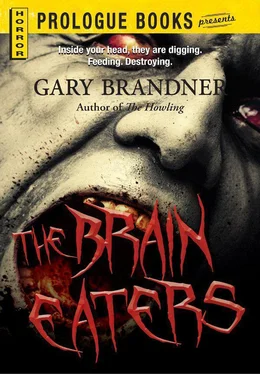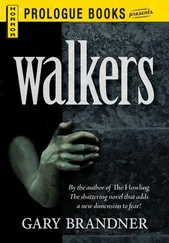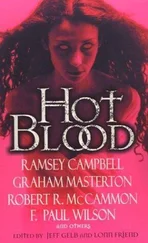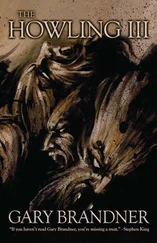“Shit,” Corey said.
Uhlander smiled beatifically. “You ought to try them yourself. You’re too tense. Take everything too seriously. You need to mellow down.”
“Damn it, Porter, I don’t want to mellow down. I want to know what’s going on here. Half the people who work in the city room are missing. The rest are cleaning out their desks.”
Uhlander smiled at him.
“And the presses have stopped.”
For the first time, the editor showed a little emotion. He said, “You noticed that. The Herald has suspended publication until …” The vague smile returned as Uhlander’s gaze drifted back toward the ceiling.
Corey waited. Finally, out of patience, he snapped, “Until when, Porter?”
“Until the disappearance of the brain eaters or the end of the world — whichever comes first.” The editor giggled.
“How many of those happy pills did you take, anyway?”
“Two or three. Maybe six. It really doesn’t matter, does it?”
“I suppose not,” Corey said wearily. “Is Mr. Eichorn still here?”
“Noooo,” Uhlander drawled. “He beat it back to Houston. It seems his daughter is feeling poorly. The Eich is afraid it might be” — he tapped his forehead — ” you know.”
The editor focused on something beyond Corey. He raised a hand in a cheery wave. “Come right on in. Don’t be shy. The more the merrier.”
Corey turned to see Doc Ingersoll coming through the open door to the editor’s office. He looked even more haggard than usual. His shirt was badly wilted, and the front of his suit was peppered with cigarette ash.
“Thank God somebody’s here who can talk sense,” Corey said. “You’re not popping goofballs, too, are you?”
“That’s not my vice,” Doc said. “But our friend Porter just might have the right idea.”
“What’s the story here. What’s all this suspend-publication shit.”
“That’s the new rules from Washington. Like everybody else, we are now operating as part of a media pool. Every population center has one newspaper printed and one radio and TV station on the air. You can bet that in Milwaukee the newspaper ain’t us.”
“A pool? What the fuck is the reason for that?”
“Attrition, for one thing. There aren’t enough people on their feet to keep everything going.”
“Jesus. That bad?”
“Worse. You remember that graph I drew up? The one that showed the brain-eater attacks growing geometrically? I think I was too optimistic.”
“Who’s giving the orders?”
“Harv Gehrman from over at the Journal was made the pool captain.”
“At least they put a real newspaperman in charge,” Corey said.
“Don’t get overconfident. A man from the Department of Commerce is on his way to take over.”
Corey groaned. “I should have known.”
Porter Uhlander spoke up, startling the two reporters, who had forgotten for the moment that he was there. “You boys might as well take the rest of the day off. Enjoy yourself. Nothing to do around here.”
“Thanks, chief,” Corey said.
“Don’t mention it.”
As they left the office together, Porter Uhlander smiled benignly at their departing backs.
“I hear there was some trouble up at Biotron,” Doc said.
“Where did you hear that?”
“UPI.”
“The wire services are still operating, then?”
“Tri-State shut down, but we’re still getting AP and UPI, along with Reuters and Tass.”
“Let’s go take a look at what they’ve got. On the way I’ll fill you in on the Biotron business.”
• • •
The wire-service reports were full of bad news and more bad news.
The number of victims struck by the brain eaters was mounting faster than the names could be recorded. Hospitals were running out of beds, due largely to people who had nothing more than simple colds or the flu or uncomplicated headaches. They had read enough about the brain-eaters symptoms to be justifiably scared out of their wits. Conversely, many who had been legitimately attacked by the parasites refused to accept the fact and screamed their way into madness and death, denying all the while that the brain eaters had them.
In view of the situation, the surgeon general had grudgingly admitted that there was indeed something to be worried about. He announced the setting up of a national task force of physicians to come up with a solution. Since there was so far no effective treatment for the victims, this news did little to calm the populace.
The story of what was now called the Biotron Massacre was reported merely as one more incident in a time of madness. Two security guards, an official of the Department of Health, and an unknown number of brain-eater victims, said to be Biotron employees, had died before state police and National Guardsmen were able to restore order.
The guard had been called out elsewhere, too, primarily in large cities where looting was on the rise. It seemed that for some the lure of an unguarded color television set could overpower any concern about having their brains chewed out. There was a growing clamor for martial law. So far the president was noncommittal.
Commerce and industry were closing down all across the country as people grew reluctant to leave their homes.
The commissioner of baseball announced the suspension of the season until further notice. Fans paid little attention except in Seattle, where the Mariners had the best record of their history and were already talking about the playoffs. The manager hinted darkly that the whole brain-eaters panic might have been a plot by the California Angels, who were in a horrendous batting slump.
Theaters, concert halls, schools, even churches — anyplace where crowds of people gathered — were closed. Stores were locking their doors, bringing on a rash of hoarding and a sudden shortage of consumer goods. Emergency plans for rationing were under way in Washington.
The reactions from other countries were as varied as might be expected.
Great Britain offered help in the form of medical personnel and supplies.
The USSR suggested that the affliction was an expected result of the decadent Western life-style.
France hinted that the decay of American brains had begun long ago.
Mexico lined the border with troops to keep out would-be immigrants.
Cuba threatened a missile reprisal if the brain eaters were spread to Havana.
Canada offered assistance as long as U.S. citizens did not try to move up there.
Central America and the Middle East were too absorbed in their own wars and revolutions to pay much attention to what happened in the United States.
And the horror stories continued. The reports of bloody rampages by victims of the parasites had lost their power to shock, owing to the sheer number of such incidents.
A schoolteacher in Orlando …
A farmer outside Des Moines …
A pensioner in Albuquerque …
A nine-year-old girl in Portland …
As Corey shuffled through the repetitive stories of mayhem and death, he suddenly laughed.
Doc cocked an eyebrow. “Something funny?”
“Not really.” Corey handed him the sheet with the story he had been reading.
DOOMSDAY WATCHERS FLEE HILLTOP
Some thirty members of the New Faith and Final Judgment Church fled in panic from the hilltop outside Biloxi where they had been awaiting “judgment day” when one of their number attacked the Reverend Clayton Cadwallader with a ceremonial crucifix. Witnesses describe a behavior pattern in the assailant similar to victims across the country of the “brain eater” parasites.
Doc Ingersoll let the sheet fall onto the pile. “You’re right,” he said. “It’s not really funny.” Then he laughed. “But what the hell; you can’t cry all the time. Do you suppose the reverend is still sitting up there on the hill?”
Читать дальше












